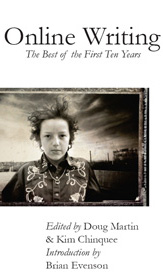 Online Writing: The Best of the First Ten Years (Snowvigate) collects poetry, fiction, and nonfiction from 115 writers and 56 online journals from Action, Yes to zafusy. Says Michael Kimball of the anthology: “The internet machine has been a great boon to innovative writing and it’s wonderful to see so much of it collected here in book form.”
Online Writing: The Best of the First Ten Years (Snowvigate) collects poetry, fiction, and nonfiction from 115 writers and 56 online journals from Action, Yes to zafusy. Says Michael Kimball of the anthology: “The internet machine has been a great boon to innovative writing and it’s wonderful to see so much of it collected here in book form.”
Edited by Doug Martin and Kim Chinquee with an introduction by Brian Evenson, Online Writing: The Best of the First Ten Years will be available November 1.
How would you summarize the mood of Online Writing: The Best of the First Ten Years?
Doug: Although there is a fair share of traditional approaches to genre in the book, the pieces I enjoy most are the ones which tremble in the bliss of language. In a sense, there is awareness by the reader that the pieces wrote themselves, that language controlled the author more than the author controlled language, at least during the first several drafts of composition.
Historically speaking, what cyber magazines were most influential in posting the types of fiction we find prevalent online today?
Doug: Elimae, 5th Trope, Web Conjunctions, and MississippiReview.com were instrumental in the early days of cyberspace. Much of this writing fused prose and poetry into short form, and it is everywhere today, specifically in outlets like Double Room, one of my favorites.
What are some of the advantages and disadvantages of the current fusing of poetry and prose into hybrid forms?
Doug: The best writers today are working in a field of the blank page that obliterates all definitions of prose and poetry. The blank page — or the computer screen — is a string theory universe, words flickering, looping, curling, shrinking and growing around themselves and into one another, in a myriad of dimensions. The words vibrate across and down the written page/screen. Space (the blank page) and Time (Narrative and Meter) get confused, the free verse rhythm of the sentence continues until the writing/reading stops. Joyelle McSweeney’s Nylund, the Sarcographer, is a wonderful example of this, and she has a piece in the anthology, also.
What direction or evolution — if any — will online fiction take in the future?
Doug: As we all know, writers are using YouTube to add visuality to their work, and some sites even have music to enhance the text. All of this is interesting. But ultimately humans have always needed the physicality of the word, whether that be by reading from papyrus, goatskin, or printed books. So books will survive. The reader’s body needs the tactility of books, whereas the virtual word exists under water. I like to believe with Barthes that the reader is the real hero of the text today, and if the reader doesn’t focus specifically on the words, then the whole experience for both the reader and author gets demoted. Brian Evenson’s introduction to the book highlights some of the more typographical issues that distinguish online writing from printed writing, and it is a must-read.
Yet, since websites are so cheap to construct, the internet democratizes the word, and that scares people, but it is the most crucial aspect of writing on the web. The internet is leveling the field for “star status” in contemporary literature, and that, itself, is as weighty as any book that can be held in the hands.
What type of books would Snowvigate Press like to publish in the future?
Doug: I like to read strange newspaper articles, scholarly journals, blogs on the paranormal, postmodern theology, Hindu scriptures, molecular biology texts, neurolinguistics (anything and everything to enhance my own work), so I’m open to anything written well, be it short fiction, novels, poetry, prose poetry, datebooks, essays, memoir, theory, or hybrid forms of all the above.
Doug Martin‘s poetry, fiction, reviews, and interviews have appeared in Double Room, elimae, Nimrod, 5_trope, Third Coast, Brooklyn Rail, New York Quarterly, Gauntlet, and others. A past poetry editor of Mid-American Review and founder of Snow*Vigate, Martin has been a recipient of a Theodore Morrison Scholarship in Poetry from the Bread Loaf Writers’ Conference, an Academy of American Poets Award, and a Randi Eldevik Award in Old English Prosody. His Study of Walt Whitman’s Mimetic Prosody was published by Edwin Mellen in 2004. He lives in Universal, a town of 100 in Indiana.

No Comments
Leave a Comment
trackback address